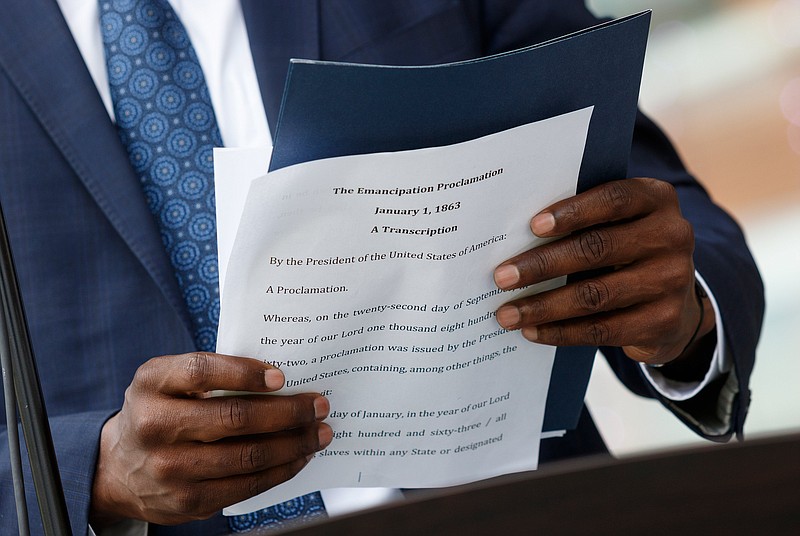You may recall a little of the uproar last year when the New York Times Magazine launched its "1619 Project," claiming that our country's founding was not 1776.
The project's idea is that the country's actual start should be assigned to 1619, the year the first known slave ship arrived in America from Africa. The premise is that the U.S. is hopelessly racist and ought better be known as a "slavocracy" rather than a "democracy" or a constitutional republic that more accurately describes it.
Such an idea should dissolve on the lack of its merits, but The Times is partnering with the Pulitzer Center to produce classroom materials based on the 1619 Project. In other words, its creators are doing their utmost to push an alternative history onto schoolkids that many prominent historians say is full of errors and represents "a displacement of historical understanding by ideology."
The Times is also running ads on social media touting the Project as a way to sell subscriptions and ponied up for a pricey ad promoting the Project featuring R&B singer Janelle Monae during the Oscars.
Dr. Wilfred M. McClay, the G.T. and Libby Blankenship Chair in the History of Liberty at the University of Oklahoma and the former SunTrust Bank Chair of Excellence in Humanities at the University of Tennessee at Chattanooga, said in an article for Commentary, "Considered strictly as an exercise in historical understanding, and in deepening the public's understanding of a profound issue in our national past, the Project represents a giant missed opportunity. It passes over the complex truth in favor of an exaggeration bordering on travesty. And if it has any influence, that influence will be as likely as not to damage the nation and distort its self-understanding in truly harmful ways - ways that will perhaps be most harmful of all to Americans of African descent, who do not need to be supplied with yet another reason to feel cut off from the promise of American life."
He, like other historians in considering and properly marking the 400th anniversary of the event, does not deny slavery's implicit place in American history. Its existence, after all, was in contradiction to the high ideals with which the Founding Fathers formed our country, was a primary cause of a brutal war that tore the nation asunder 85 years after its founding and has consequences the country is still dealing with today.
(MORE: Year of Return, 1619-2019: Two perspectives on pilgrimage to Ghana's slave castle)
But the Project's sources, according to McClay, "seek to link the alleged productivity of slavery to the triumph of capitalism in America - and thereby seek to transfer the stain of slavery to every malady of present-day American life, from income inequality to climate change to the decline of unions to the Great Recession of 2008."
However, he said "elementary accounting errors" about productivity in such sources make such claims "demonstrably wrong."
One of the more recent responses to the Project is "1776," a coalition of scholars, grassroots leaders and advocates put together by The Woodson Center in Washington that challenges the assertion of the country's founding being defined by slavery.
Carrie Sheffield posits in an article on "1776" for Inside Sources that the premise of the 1619 Project is flawed, even dangerous.
Acknowledging that the Founding Fathers' framework to empower all Americans was not initially filled because of slavery, she said "the founding documents contained the instruments of their own improvement (including the amendment process), thereby allowing a fulfillment of this creed for all Americans."
Saying categorically that 1776 should remain the country's founding year, Sheffield wrote that "while we recognize slavery and discrimination are a tragic part of our nation's history, through '1776' we choose to highlight America's promise and to elevate the inspiring stories of blacks who rose and achieved and thrived - in spite of prejudice."
The "1776" coalition includes the likes of liberal Pulitzer Prize-winning columnist Clarence Page and MIT-trained Brown University economics professor Glenn Loury but also predominantly black grassroots leaders working to lift people from poverty, reduce incarceration, break up gangs and rescue women from prostitution.
"We believe," said Sheffield, "that some within the black community have degraded Dr. Martin Luther King Jr.'s message of racial reconciliation and contorted it into a dystopian hopelessness. At '1776,' we choose instead to amplify voices of black achievement, forgotten historical figures who built their own thriving hospitals, schools and businesses when they were denied access to white establishments."
Such stories of achievement, by individuals of every color, are what this country has traditionally been built on and what gives its inhabitants the strength and character to go and do likewise. To claim that everything the country has accomplished, and whatever ails it today, can and must be traced to slavery is - on the other hand - a dark and dispiriting way to view life.
As a mother we once knew said of the indiscriminate use of certain four-letter words, it's not "uplifting".
